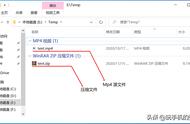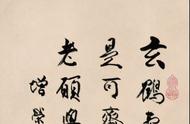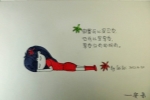介词in on 用法(举例及图解)

年月周前要用in,日子前面却不行。
遇到几号要用on,上午下午又是in;
要说某日上下午,用on换in才能行。
午夜黄昏用at,黎明用它也不错;
介词in,on,at的用法:一. in,on在方位名词前的区别
1. in表示A地在B地范围之内。
如: Taiwan is in the southeast of China.
2. on表示A地与B地接壤、毗邻。
如: North Korea is on the east of China.
表示方位的名词east(东),west(西), south(南), north(北)等前面都能用表示方位介词in, on和to,那么这三个介词的用法:
I. "in the 方位名词"指的是小范围在一个大范围的里面,表示"在某范围之内",强调两者的包含关系。
如: Beijing is in the north of China. 北京在中国的北部。
II. "on the 方位名词"指的是一个范围紧挨着另一个范围,表示"两地接壤",强调两者为相邻关系。
如: Korea is on the northeast of China. 朝鲜在中国的东北面。
III. "to the 方位名词"指的是一个范围和另一个范围之间隔段距离,表示"在某范围之外",强调两者是远离关系。
如: Japan is to the east of China. 日本位于中国的东边。
二. at, in, on在表示时间上的区别
at表示时间的一点;in表示一个时期;on表示特殊日子。如:
He goes to school at seven o’clock in the morning. 他早晨七点上学。
Can you finish the work in two days. 你能在两天内完成这个工作吗?
Linda was born on the second of May. 琳达五月二日出生。
1. at指时间表示:
at后常接几点几分,天明,中午,日出,日落,开始等。如:
at five o’clock (五点), at down (黎明), at daybreak (天亮),
at sunrise (日出), at noon (中午), at sunset (日落),
at midnight (半夜), at the beginning of the month (月初),
at that time (那时), at that moment (那会儿),
at this time of day (在一天的这个时候)。
(1)时间的一点、时刻等。
如:They came home at sunrise
(at noon, at midnight, at ten o’clock, at daybreak, at dawn)
(2)较短暂的一段时间。可指某个节日或被认为是一年中标志大事的日子。
如:He went home at Christmas
(at New Year, at the Spring Festival, at night).
2. in指时间表示:
in后常接年,月,日期,上午,下午,晚上,白天,季节,世纪等。如:
in 2006(2006年),in May,2004 (2004年五月),in the morning (早晨/上午),
in the afternoon (下午),in the evening (晚上),in the night (夜晚),
in the daytime (白天),in the 21st century (21世纪),
in three days (weeks/month)三天(周/个月),in a week (一周),
in spring (春季)。
(1)在某个较长的时间(如世纪、朝代、年、月、季节以及泛指的上午、下午或傍晚等)内。
如:in 2004, in March, in spring, in the morning, in the evening, etc
(2)在一段时间之后。一般情况下,用于将来时,谓语动词为瞬间动词,意为“在……以后”。
如: He will arrive in two hours.
谓语动词为延续性动词时,in意为“在……以内”。
如: These products will be produced in a month.
注意:after用于将来时间也指一段时间之后,但其后的时间是“一点”,而不是“一段”。
如: He will arrive after two o’clock.
3. on指时间表示:
on后常接某日,星期几,某日或某周日的朝夕,节日等。如:
on Sunday (星期日),on a warm morning in April (四月的一个温暖的上午),
on a December night (12月的一个夜晚),on that afternoon (那天下午),
on the following night (下一个晚上),on Christmas afternoon (圣诞节下午),
on October 1,1949 (1949年10月1日),on New Year’s Day (新年),
on New Year’s Eve (除夕),on the morning of the 15th (15日的早上)等。
(1)具体的时日和一个特定的时间,如某日、某节日、星期几等。
如:On Christmas Day(On May 4th), there will be a celebration.
(2)在某个特定的早晨、下午或晚上。
如: He arrived at 10 o’clock on the night of the 5th.
(3)准时,按时。
如: If the train should be on time, I should reach home before dark.
三. at, in和on表示地点时的区别
1. at表示把地方、地点、位置当作一个“点”:
(1)用于指较小的地方。如:
1. The begger is sitting at the corner. 那乞丐坐在角落里。
2. Jane is waiting for you at the bus stop. Jane在巴士站等你。
3. at home 在家
4. Who's standing there at the door? 谁站在门口?
5. at the top of the page 在一页的上面
6. The shop is at the end of the road. 那商店就在路的尾端。
7. at the entrance 在进口处
8. at the crossroads 在十字路口
9. When will you arrive at the office? 你什么时候会到公司呢?
10. I'm in France, at Paris. 我住在法国巴黎。(相对法国来讲,巴黎只是一个
“点”)
11. There is a small hut at the foot of the hill. 山脚下有一座小屋子。
12. at the side 在一边
13. at reception 在招待会上
14. I'm at work. 我在工作。
15. at class/ home/ the library/ the office/ school 在班上/家里/图书馆/公
司/学校
(2)用于门牌号码前。 如:
My aunt lives at 55 Boretz Road in Durham.
我的姑妈住在Durham,Boretz 路门牌55号。(地址要用at,不能用in)
2. in表示把地方、地点、位置当作一个范围或一个封闭的空间:
1. I live in London. 我住在伦敦。(大城市用in)
2. I live in England, at London. 我住在英国伦敦。(England大过London)
3. I live in a big city, my sister lives at a small town.
我住在大城市,我姐姐住在一个小市镇。
(如果把city看做一个圆圈,small town就成一个点。)
4. We have a meeting in Beijing. 我们有北京有一个会议。
5. Mars is in the Solar System. 火星在太阳系里。
6. in a car 乘汽车 (不是 on a car 也不是 by a car )
7. in a taxi 乘的士 (不是 on a taxi 或 by a taxi )
8. in a helicopter 乘直升机
9. in a boat 乘小船
10. in a lift (elevator) 乘电梯 (电梯像个笼子,当然要用 in )
11. in the newspaper 在报上
12. in the sky 在空中
13.in the bed 在床上 (也可用 on the bed)
14. in the bedroom/ class
图解: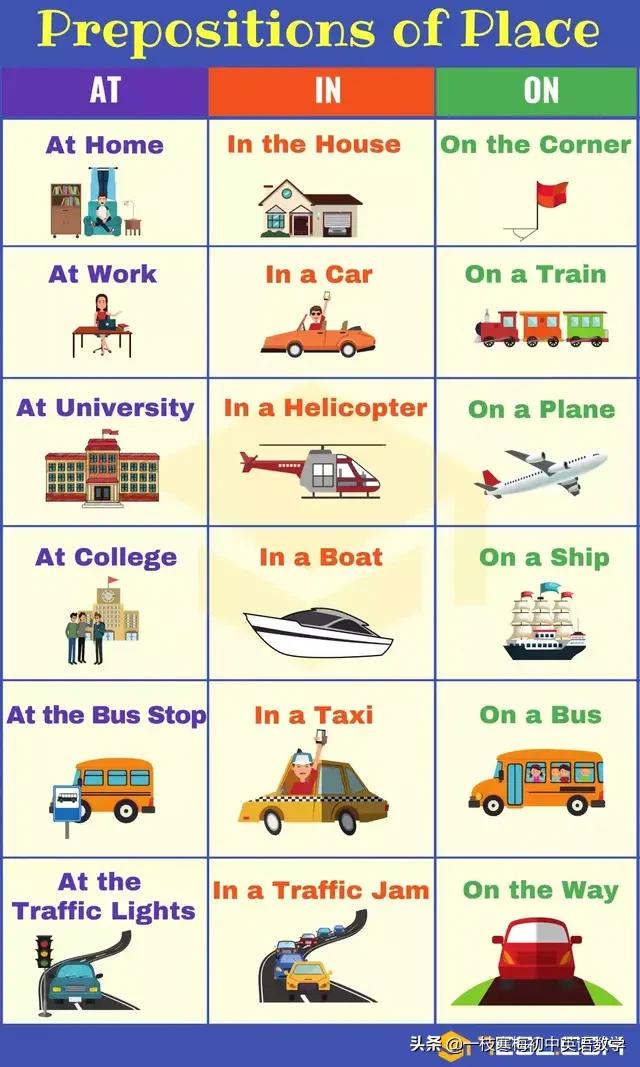
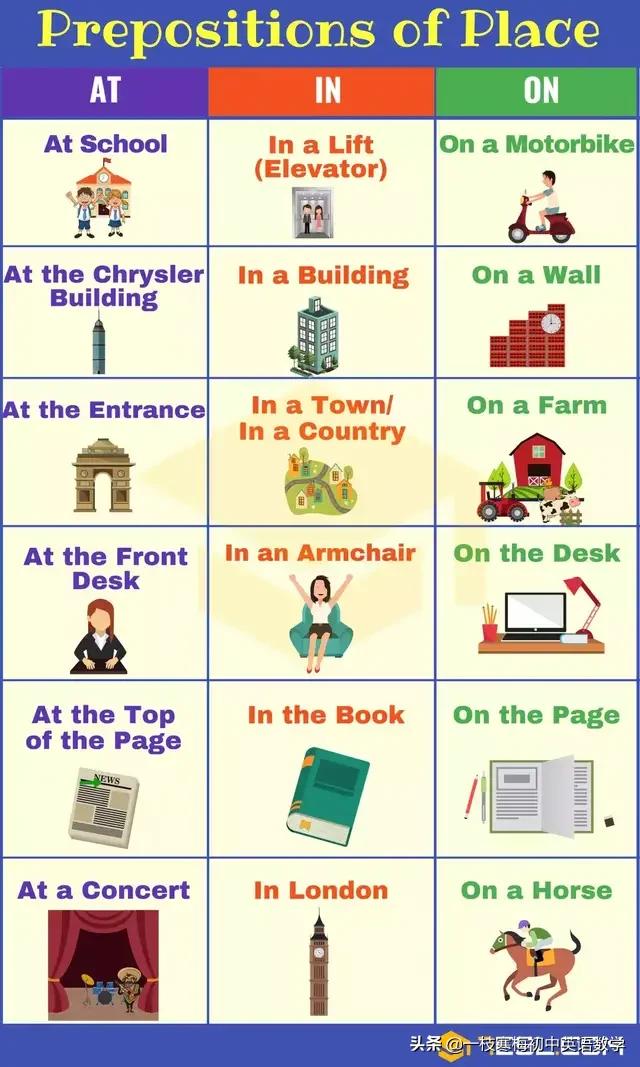
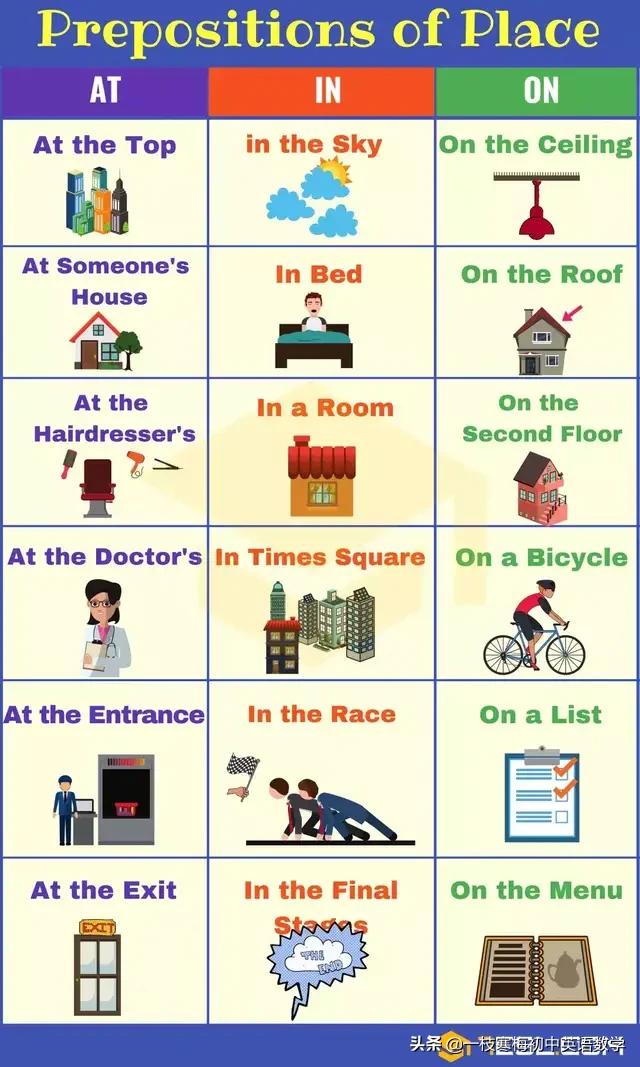

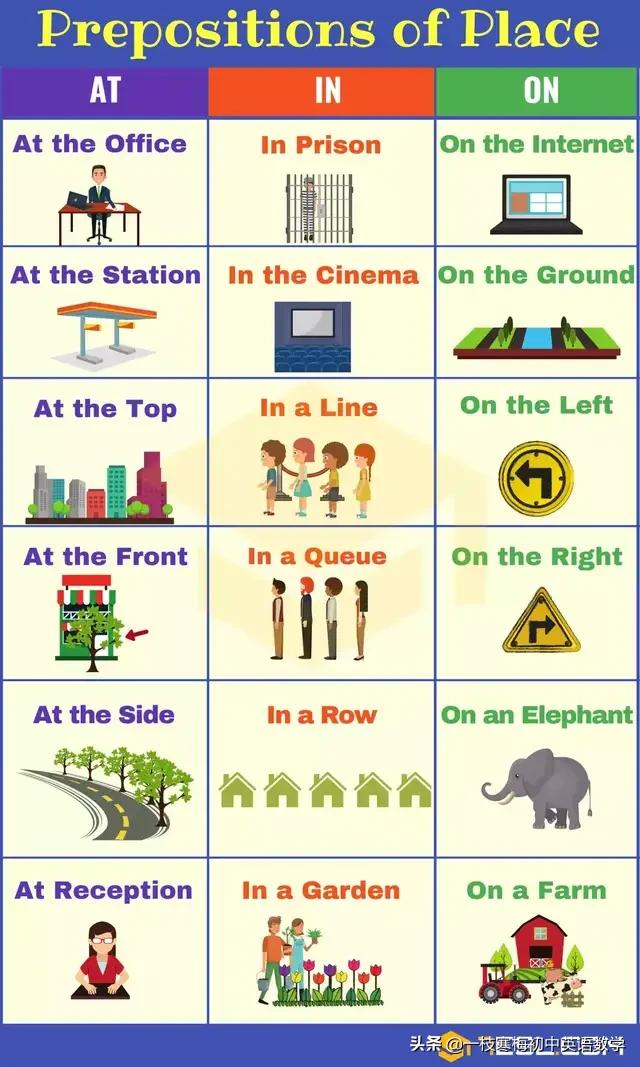
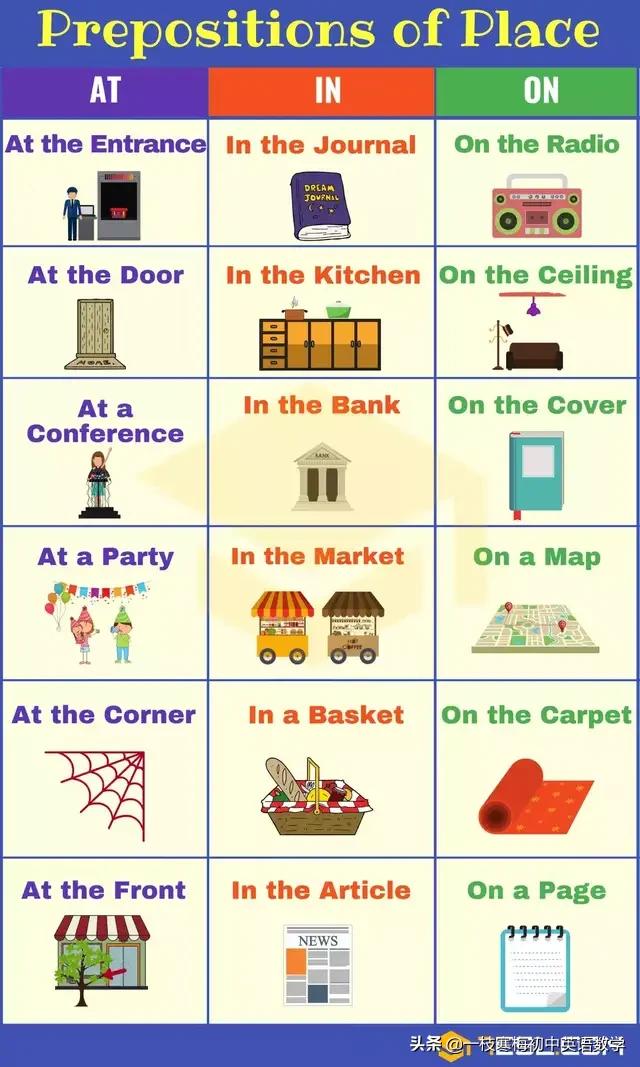
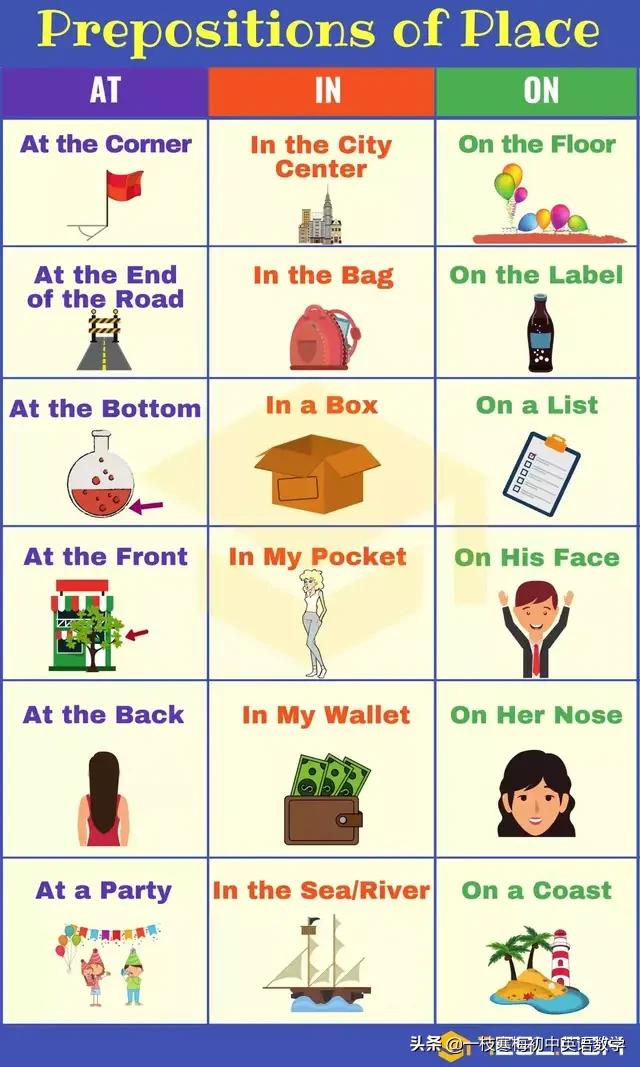
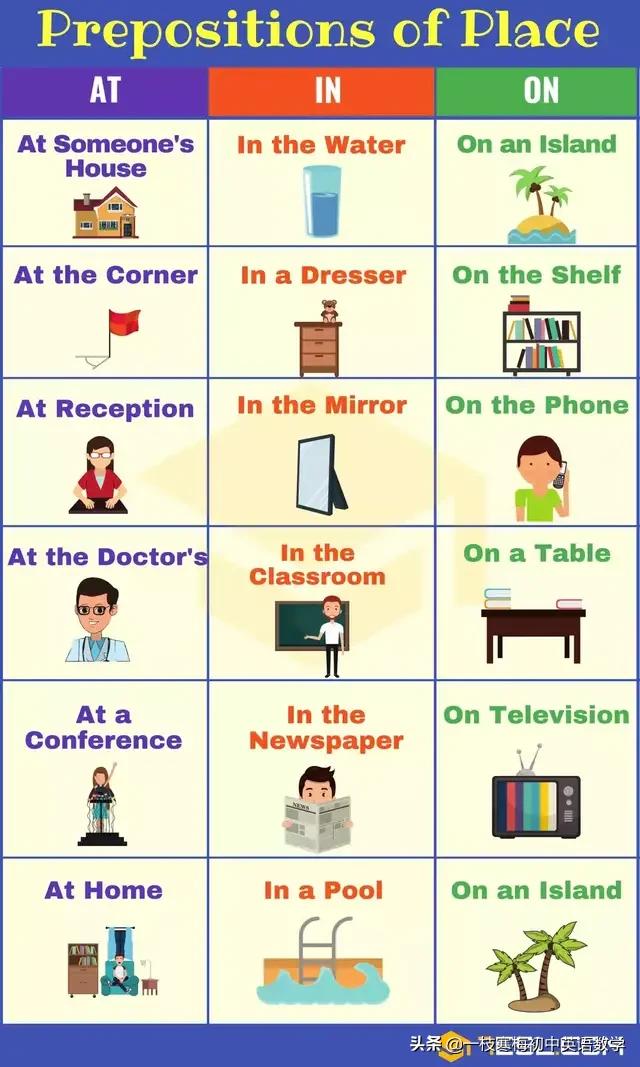
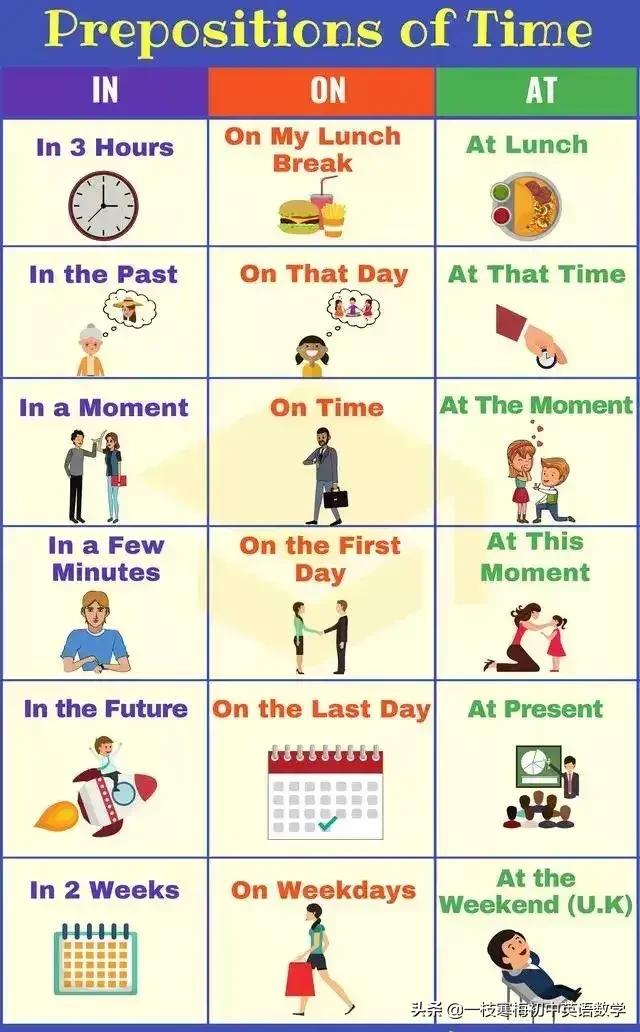
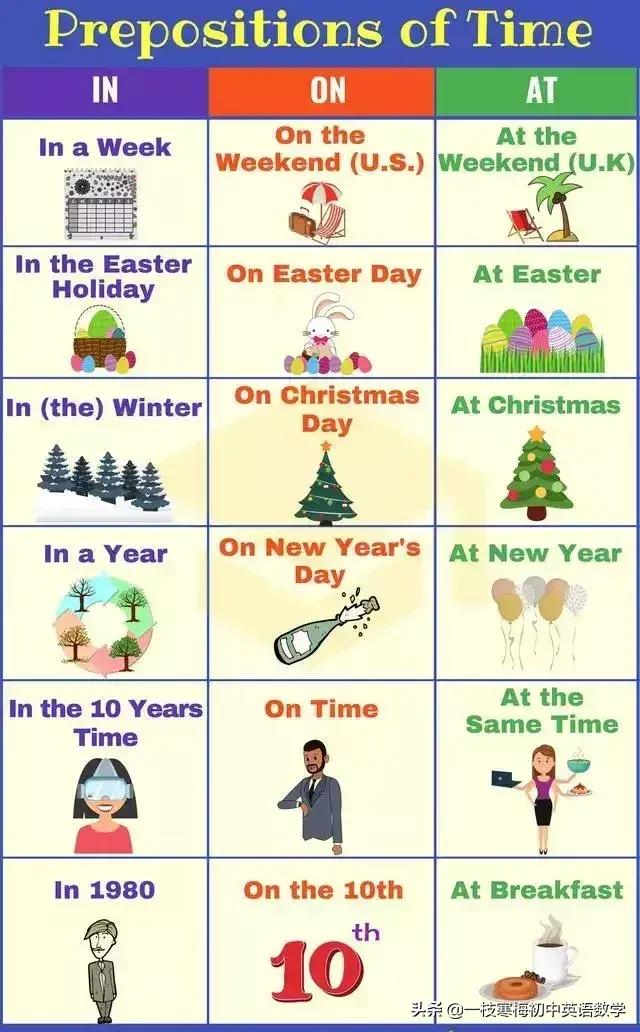

- 油菜花开的句子唯美简短(那些春天里油菜花的唯美诗句)
- 不吃药快速治感冒小妙招(3个方法“治”感冒效果好)
- 哪里可以学滑翔伞(顺顺溜溜)
- 喝什么茶能增强免疫力最好(助您提高免疫力)
- 新生宝宝棉衣棉裤制作教程(又给宝宝做了一套新棉衣)
- 被毒蛇咬了怎么办自救方法(这6个方法)
- 苹果怎么拦截所有陌生来电和短信(你或许需要学会这些设置和技巧)
- 微信更换实名认证要求(微信更换实名认证的操作)
- 教师资格证怎么考多个学科(想要两个证书该怎么考)
- 现代流行歌曲大全100首(2020不能不聽的100首歌40首中文流行音樂)
- 莫桑石和钻石哪个更好(莫桑钻可以代替钻石吗)
- 蛏子对男人的营养价值及功效(生活不要太节俭)
- 酸菜鱼怎么切鱼片视频教程(在家切鱼片)
- 教你画好看的海边小景(宅家学画画吧)
- 重置网络全部命令(网络正常连接但是无法正常上网(我来教你))
- 己亥杂诗诗词大意(龚自珍《己亥杂诗》赏析)
- 怎么把cad的图复制到word(cad图复制到word文件及cad打开dwf文件插入照片)
- 妄想山海中山海一号怎么加燃料(山海一号使用技巧)









